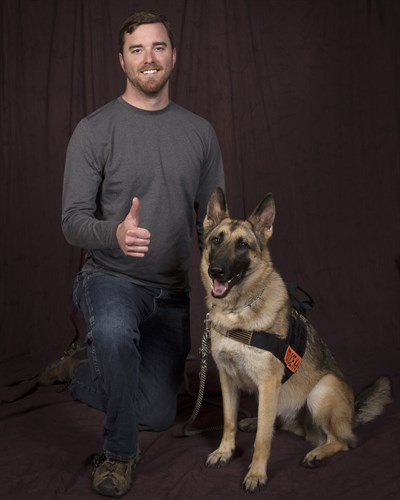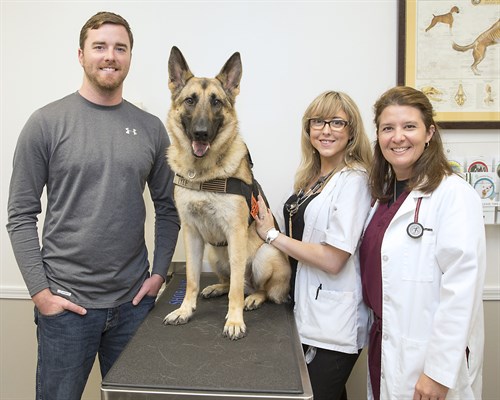Cole Lyle and Kaya: Endless PAWS-abilities

Cole Lyle, a 26-year-old veteran of the Afghanistan War, is working to combat the tragic effects of post-traumatic stress disorder (PTSD), a mental health condition triggered by experiencing a terrifying event, such as war. With his service dog, Kaya, at his side, Lyle is working to pass legislation that would provide veterans with PTSD easier access to service dogs.
Despite Lyle’s busy schedule collaborating with members of Congress, Kaya’s care is still of utmost importance. In support of Lyle’s efforts to provide veterans with PTSD easier access to service dogs, the Texas A&M College of Veterinary Medicine & Biomedical Sciences (CVM) is providing Kaya’s care free of cost. Although Kaya has changed Lyle’s life for the better, service dogs are not provided by the U.S. Department of Veterans Affairs (VA) for veterans with PTSD. But, Lyle is hopeful for a change.
“The VA does not provide service dogs for veterans to specifically combat symptoms of post-traumatic stress,” Lyle said. “I am trying to change that via H.R. 4764, which is the Puppies Assisting Wounded Servicemembers (PAWS) Act.”
Motivated by his own experience with PTSD and the tragic deaths of peers suffering from the condition, Cole Lyle has been pursuing the PAWS Act for over two years. Lyle, like some veterans, did not find relief from traditional treatments, such as medication and counseling sessions.
“When I got out of the military I was 22 years old, and I tried to utilize the VA system,” Lyle explained. “I took pills and even went to counseling, but my symptoms seemed to stagnate or get worse. Concurrent with getting out of the military, I had a couple friends commit suicide as a result of post-traumatic stress and I was also experiencing a divorce. I didn’t have the support system of my military family, I didn’t have a job, wasn’t in school, and I felt like I didn’t have a sense of purpose anymore. I was tired of feeling this way, so I took the proactive step of quitting pills and exploring other options.”
After bonding with Kaya, the relationship with his service dog positively changed Lyle’s life.

“There were days when I just didn’t want to get out of bed,” he said. “When Kaya came into my life, I felt responsible for her care. The responsibility of taking care of Kaya helped me regain a sense of purpose, which is something pills could not do for me.”
In addition, Kaya’s special training-which includes waking Lyle up from nightmares and responding to anxiety attacks, if needed-gave him hope that service dogs could be the solution for veterans who do not respond to traditional treatments for PTSD.
But after researching service dogs, Lyle found that the VA does not readily provide them for veterans suffering from PTSD, citing a lack of evidence that service dogs help relieve PTSD symptoms. “The VA claimed there was a lack of empirical evidence to support that dogs specifically trained to combat PTSD symptoms were viable,” Lyle said. “I thought that was a lackluster response, because anybody that has ever owned a dog could tell you that they are therapeutic.”
Determined to find relief from his condition, Lyle bought Kaya from a breeder and paid for her training. Kaya’s total cost, including initial shots and training, was roughly $10,000. The expense was paid out-of-pocket by Lyle.
“Service dogs are specifically trained to do certain things, such as wake somebody up from a nightmare and assist with anxiety attacks,” Lyle said. “The temperament, the specific training, and the cost to pay the people who train the dog, are all factors to consider when pricing a service dog. The average cost is probably closer to $20,000.”
After Kaya was fully trained, she became a part of Lyle’s everyday life. She attends class with Lyle at Texas A&M;, visits the grocery store, and loves accompanying Lyle on his trips. In fact, an innocent stroll with Kaya in Washington D.C. was the beginning of Cole Lyle’s journey in creating the PAWS Act. “I was in Washington D.C. walking with Kaya when a United States Senator approached me and asked me about her,” he explained. “I started talking about Kaya and told him that the VA doesn’t provide service dogs to veterans suffering from PTSD. The Senator asked, ‘What do you think we should do about it?’ and I said, ‘You’re the policymaker, you tell me.'”
The Senator invited Lyle to his office where they discussed possible solutions to the lack of service dogs available for veterans with PTSD. Although that particular policymaker didn’t initiate legislation, the encounter gave Lyle the idea to lobby Congress and find someone who would. Cole Lyle has been working with Congressman Ron DeSantis of Florida to craft the PAWS Act and lobby other members of Congress to support it since May 2015.
In March of 2016, the bill was introduced to the House of Representatives, where it was referred to the VA Committee. Only time will tell if Lyle’s PAWS Act will become a law. “This is not something that is partisan,” he said. “Republicans and Democrats both understand the need to reduce the number of veteran suicides. We have a lot of support in different areas and in many different demographics and are optimistic about our chances for success.”
Kaya has played such a positive and inspirational role in Lyle’s life. Her continuing health is of utmost importance to the CVM for both Kaya and Lyle’s well-being. The CVM looks forward to the success of Lyle and Kaya in their efforts to make the world a better place for veterans with PTSD.
Puppies Assisting Wounded Servicemembers (P.A.W.S) ACT Mission Statement: To inform members of Congress, using subject-matter experts and veterans with first-hand experience, of the benefits of service dogs who assist veterans with symptoms of post-traumatic stress; and to influence members of Congress to enact sound policy to expand veteran access to service dogs as medically necessary instruments for rehabilitation through the Veterans’ Affairs Department.


